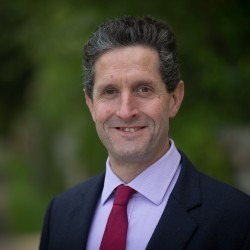Sessions With Myles Allen
Monday, 18 March
-
01:30pm - 02:00pm (CST) / 18/mar/2024 06:30 pm - 18/mar/2024 07:00 pm
Weathering the Change: What are the links between climate change and extreme events?
Climate & SustainabilityAs our planet undergoes unprecedented environmental shifts, understanding the connections between climate change and extreme weather phenomena becomes increasingly vital. From hurricanes and wildfires to heatwaves and flooding, extreme events are becoming more frequent and intense, posing significant challenges to communities worldwide. We will delve into the scientific evidence and mechanisms behind the escalating frequency and severity of extreme events in a changing climate. How are rising global temperatures, altered precipitation patterns and shifting atmospheric dynamics influencing the occurrence and intensity of extreme weather events? This panel promises to deepen your understanding of the urgent challenges posed by climate change–induced extreme events and inspire collective action toward a more resilient and sustainable future.
Tuesday, 19 March
-
11:50am - 12:40pm (CST) / 19/mar/2024 04:50 pm - 19/mar/2024 05:40 pm
Growing Global Footprint of CCUS: What are the models for deployment?
Clean TechThe robust pipeline of Carbon, Capture, Utilization and Storage (CCUS) projects globally points to strong growth in the coming years. The technology is being deployed across a range of industrial applications, including hard-to-abate sectors, industrial hubs and power plants. At the same time, companies are testing different business models, including CCUS-as-a-service, sharing of CO2 infrastructure in industrial hubs and cross-border collaboration to connect emitters with CO2 transportation and storage facilities. What are the results of experimenting with these emerging business models? How replicable are they across different regions and policy environments? Which CCUS technologies are best suited to different deployment situations?
-
03:30pm - 04:15pm (CST) / 19/mar/2024 08:30 pm - 19/mar/2024 09:15 pm
University of Oxford | Decarbonizing Fossil Fuels: The Role of Producers in Achieving Net Zero
In scenarios that meet the goals of the Paris Agreement, we stop fossil fuels from causing global warming—through safe and permanent disposal of all the carbon dioxide they generate—many decades before the world stops using fossil fuels. What these scenarios don’t say is how to—and who should—make this happen. Join “the physicist behind Net Zero” for a challenging but hopeful exploration of the role and responsibilities of the fossil fuel industry itself, along with its customers, regulators and shareholders, in solving the climate challenge.
- Speakers:
- Myles Allen
-
06:00pm - 06:30pm (CST) / 19/mar/2024 11:00 pm - 19/mar/2024 11:30 pm
How to Get Net Zero Right
Achieving net-zero emissions by mid-century represents a pivotal step toward fulfilling the objectives outlined in the Paris Agreement. Consequently, an increasing number of nations and corporations are committing to the net-zero target by 2050. Various strategies exist to attain net-zero emissions, each differing in terms of their robustness and effectiveness. In this dynamic discussion, we explore the multifaceted challenges and opportunities surrounding the pursuit of net-zero targets across industries and sectors. Join us as we delve into best practices, lessons learned and actionable strategies to navigate the complexities of the net-zero transition, ensuring a sustainable and prosperous future for generations to come.
- Speakers:
- Myles Allen
- Sasha Mackler
- Lori Guetre
- Ashutosh Singh
Wednesday, 20 March
-
04:30pm - 05:00pm (CST) / 20/mar/2024 09:30 pm - 20/mar/2024 10:00 pm
Demanding Change: The integral role of behavior in effective climate policy
Climate & SustainabilityMost policy action is focused on the supply side of the energy mix to address climate change. How important is consumer behavior and the demand side of the energy equation in shaping effective climate solutions? How can individual and collective actions influence the success of climate initiatives? From consumer choices to corporate practices, delve into behavioral insights that drive sustainable change. Learn how policy frameworks can incentivize eco-friendly behaviors and foster a culture of environmental stewardship. We will also discuss the growth in data analytics and AI in driving consumer behavior across various industries. Engage with experts to understand the challenges and opportunities in promoting climate-conscious actions.

